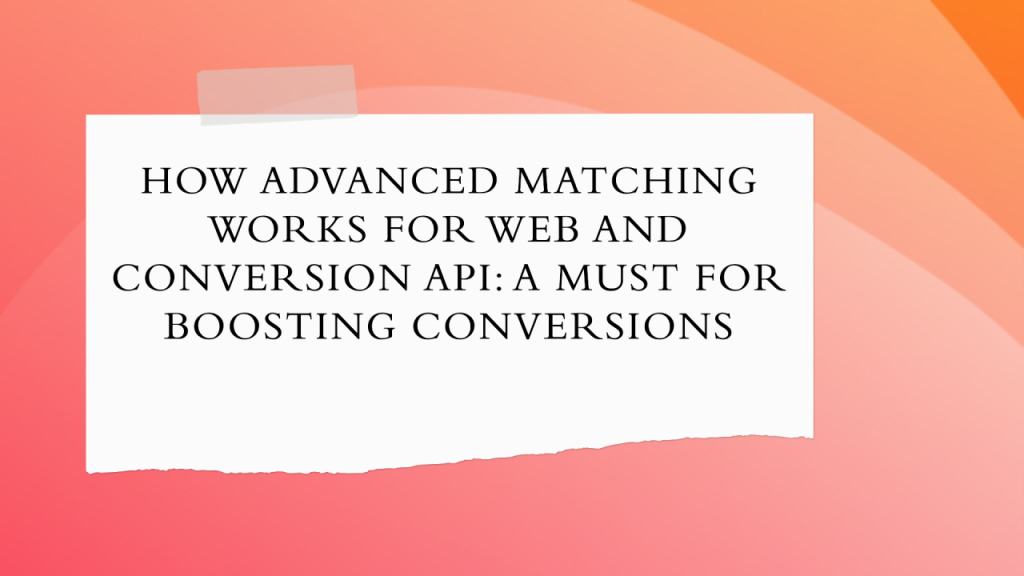
How Advanced Matching Works for Web and Conversion API: A Must for Boosting Conversions
In the evolving world of digital advertising, tracking user behavior accurately is more challenging than ever due to increasing privacy regulations and browser restrictions. To counter these challenges, Meta (Facebook) offers Advanced Matching, a powerful tool for improving data accuracy and boosting ad performance. Let’s dive into how it works, why you need it, and how it can enhance your conversion rates.
What is Advanced Matching?
Advanced Matching allows advertisers to send additional customer data (such as email addresses, phone numbers, and other identifiers) through the Meta Pixel for the web or via the Conversion API (CAPI) for server-side tracking. This extra information helps platforms like Facebook match website visitors and their actions more accurately with user profiles, even across different devices.
The key feature of Advanced Matching is that the customer data is securely hashed (encrypted) before it is sent to Facebook, ensuring privacy while enhancing tracking accuracy. Whether using web-based pixel tracking or server-side API tracking, the process helps bridge the gap in tracking caused by browser-based restrictions like ad blockers or limited cookie access.
How Advanced Matching Works
- For Web (Meta Pixel): When a user interacts with your website (such as submitting a form or making a purchase), the Meta Pixel collects data and sends it, along with hashed customer information, to Facebook. This helps improve the accuracy of event tracking and reporting, as it matches actions to users more effectively.
- For Server (Conversion API): With CAPI, you send customer data directly from your server, bypassing browser limitations altogether. Server-side data collection ensures better accuracy and resiliency, especially when cookies are blocked or browsers restrict data collection.
Why Do We Need Advanced Matching?
With increasing restrictions on traditional tracking methods (like cookies) and the rise of privacy regulations (such as GDPR and CCPA), businesses are facing difficulties in accurately tracking user behavior. Advanced Matching steps in to solve these problems by providing:
- Better Attribution: It ensures conversions and user actions are properly attributed to your ads, even when browser-based tracking is limited.
- Higher Match Rates: By sending more customer data, platforms like Facebook can better match actions to real users, increasing the accuracy of your reporting and performance data.
- Improved Ad Targeting: With more reliable data, advertisers can better target and retarget users, driving higher engagement and conversion rates.
How Advanced Matching Increases Conversions
Advanced Matching is not just about better tracking—it directly impacts conversions by improving ad performance in the following ways:
- Enhanced User Matching: By providing more detailed data (such as email, phone number, etc.), Facebook can better identify and match users, increasing the accuracy of your ad delivery.
- Improved Retargeting: With more precise data, you can retarget users who have already interacted with your website or ads, increasing the chances of conversion.
- Optimized Campaigns: Better data means more accurate insights, allowing you to optimize campaigns more effectively, leading to higher ROI and conversion rates.
Important Parameters for Advanced Matching
Here are some key parameters that can be sent through Advanced Matching to improve user identification:
- Email Address (em): Example: example@domain.com
- Phone Number (ph): Example: +1234567890
- First Name (fn): Example: John
- Last Name (ln): Example: Doe
- City (ct), State (st), ZIP (zp), Country (country)
- Date of Birth (dob): Example: 01/01/1990
- Client IP Address and User Agent for enhanced cross-device matching.
How to Hash Customer Data with Custom JS
When sending customer data through Advanced Matching, it’s essential to hash (encrypt) the information to protect user privacy. Hashing converts the data into a fixed-length string that cannot be easily reversed, ensuring security while still enabling accurate matching. This can be done using Custom JavaScript and algorithms like SHA-256. If you need help implementing this in your website, feel free to DM me for assistance.




